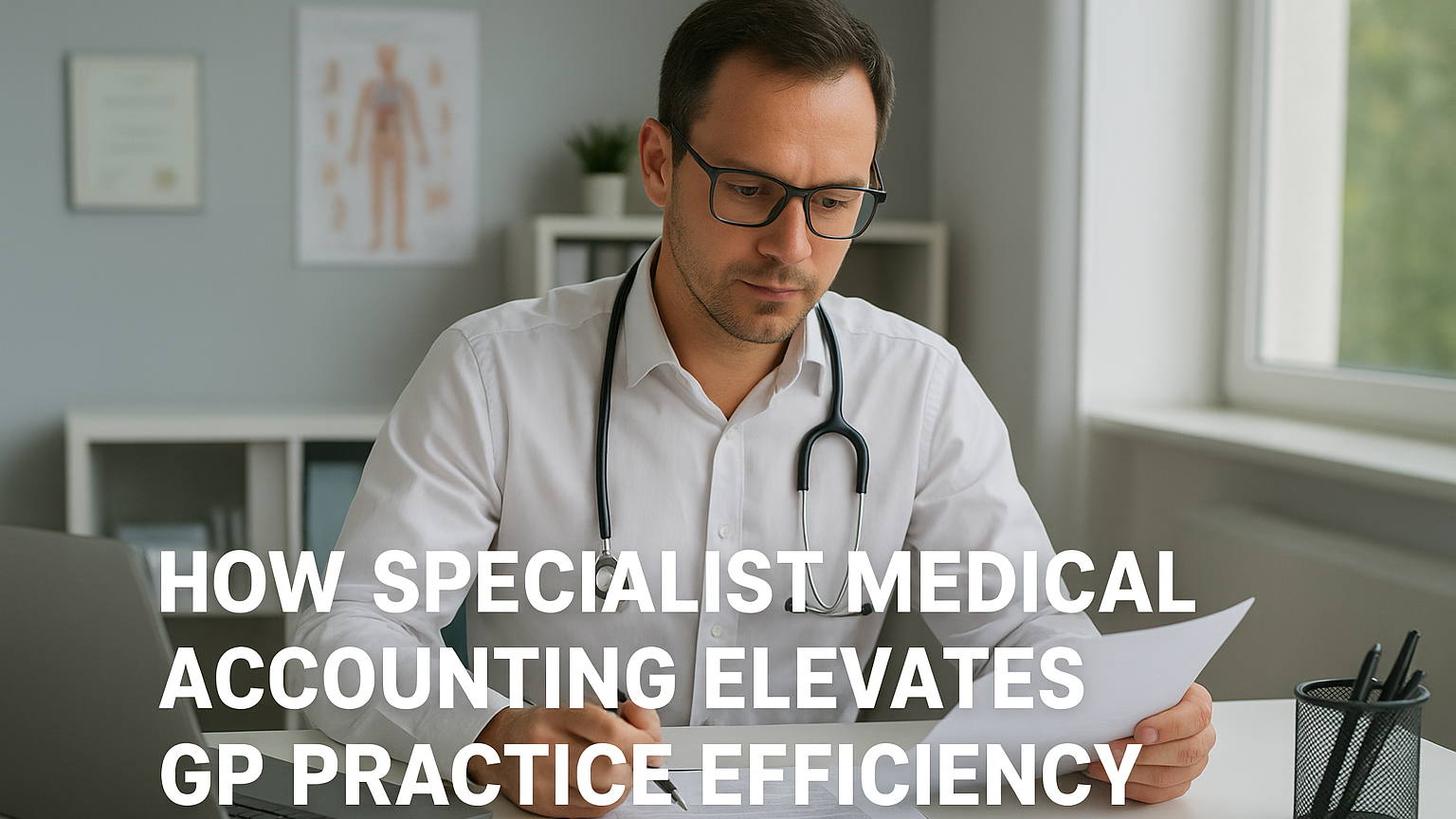Running a GP practice in the UK, whether a single surgery or a multi-partner operation, involves far more than medicine. Behind every clinic is a framework of financial systems, compliance, reporting and planning. Specialist medical accounting is not just a back-office service: it can be a driver of efficiency, sustainability and growth. This article explains how specialist medical accountants support GP practices by improving cash flow, reducing risks, saving time, and enabling smarter decision-making.
Why GP Practices Need Specialist Accountants
Sector expertise
GP practices deal with complex income streams (NHS contracts, private work, dispensing), specialist tax reliefs, pension issues (notably NHS pensions), and strict healthcare regulations. A specialist accountant understands this landscape.
Keeping up with change
Frequent updates to NHS contracts, pension rules, CQC requirements, QOF frameworks and digital reporting create heavy compliance demands. Specialists track these changes and advise proactively.
Error prevention
Incorrect treatment of NHS pensionable profits or capital allowances can lead to costly mistakes. Expertise minimises such risks.
Strategic insight
Beyond compliance, specialist accountants advise on partner structures, expansion, mergers and investment decisions.
1. Streamlined Accounting & Bookkeeping
Specialist accountants free practice managers and clinicians from admin burdens.
- Software integration: Linking accounting systems with EMIS, SystmOne and other platforms reduces duplication.
- Management accounts: Monthly or quarterly dashboards highlight profit, cash flow and budget variances.
- Debt control:
- Clear invoicing and follow-up reduce overdue payments. Cost monitoring: Benchmarking and expense reviews identify savings.
2. Cash Flow Optimisation & Forecasting
Cash flow in GP practices often fluctuates. Accountants provide stability by:
- Modelling best-, base- and worst-case forecasts.
- Smoothing partner drawings to avoid imbalances.
- Building reserves for unexpected costs.
- Timing major expenditures, such as equipment or refurbishments, to avoid strain.
3. Tax Efficiency & Reliefs
Specialist accountants ensure GP practices retain more of their income through careful tax planning:
- Claiming capital allowances on medical equipment and IT.
- Advising on premises costs and lease vs buy decisions.
- Structuring profit allocation fairly in partnerships.
- Managing VAT exemptions for healthcare services.
- Planning NHS pension contributions to balance tax and benefits.
- Using pre-year-end adjustments to optimise tax positions.
4. Partnership & Ownership Structures
Many practices operate as partnerships, but structures may evolve. Accountants support by:
- Reviewing agreements to keep profit-share and exit terms fair.
- Modelling partner entry, retirement and payouts.
- Advising on mergers or federations with other practices.
- Mitigating liability through LLPs or other structures.
5. Compliance & Risk Management
Healthcare is one of the UK’s most regulated sectors. Accountants enhance compliance by:
- Handling statutory filings, audits and tax returns.
- Establishing internal controls for revenue and expenses.
- Ensuring systems comply with GDPR and patient confidentiality.
- Supporting commissioner audits and funding claims.
- Monitoring regulatory and tax updates.
Good governance reduces financial and reputational risks.
6. Strategic Planning & Growth
Accountants do more than “balance the books” — they help practices plan the future.
- Benchmarking: Comparing financial performance with peers to identify efficiencies.
- Expansion planning: Assessing new clinics, services or acquisitions.
- Stress testing: Modelling risks such as falling NHS income or rising costs.
- Investment planning: Timing equipment purchases for maximum allowances.
- Succession planning: Preparing for retirements, sales or restructuring.
7. Time & Efficiency Gains
By handling invoicing, reconciliations, reports and compliance, specialist accountants save GPs and managers hours each week. This frees leaders to focus on patient care, staff development and innovation.
Real-World Examples
- A three-partner practice cut reconciliation time by 60% after software integration, allowing more focus on service improvement.
- A surgery planning an ultrasound suite avoided cash shortfalls through phased expenditure and capital allowances advice.
- A rural two-partner practice avoided disputes by modelling exit scenarios during restructuring.
FAQs
Q: How is a specialist medical accountant different from a general one?
They understand NHS contracts, pensions, tax reliefs and compliance unique to healthcare.
Q: Isn’t accounting just bookkeeping?
No — it also covers forecasting, structuring, compliance and strategic planning.
Q: What does it cost?
Costs vary, but benefits usually outweigh fees through efficiency, tax savings and risk reduction.
Q: How quickly will results show?
Some benefits appear in months; structural gains may take up to a year.
Q: Are there risks?
The main risks are choosing a non-specialist firm or relying too heavily without internal oversight.
Q: Can accountants help with NHS contracts?
Yes — they assist with submissions, audits and financial compliance.
Q: Should we become a limited company?
It depends on liability, tax position and growth plans; a specialist can model the options.
Conclusion
A GP practice blends patient care with business demands. Specialist medical accounting is not just about compliance, it drives efficiency, strengthens cash flow, optimises tax, safeguards governance and supports strategic growth. The result is more time, stability and confidence to focus on delivering outstanding healthcare.







